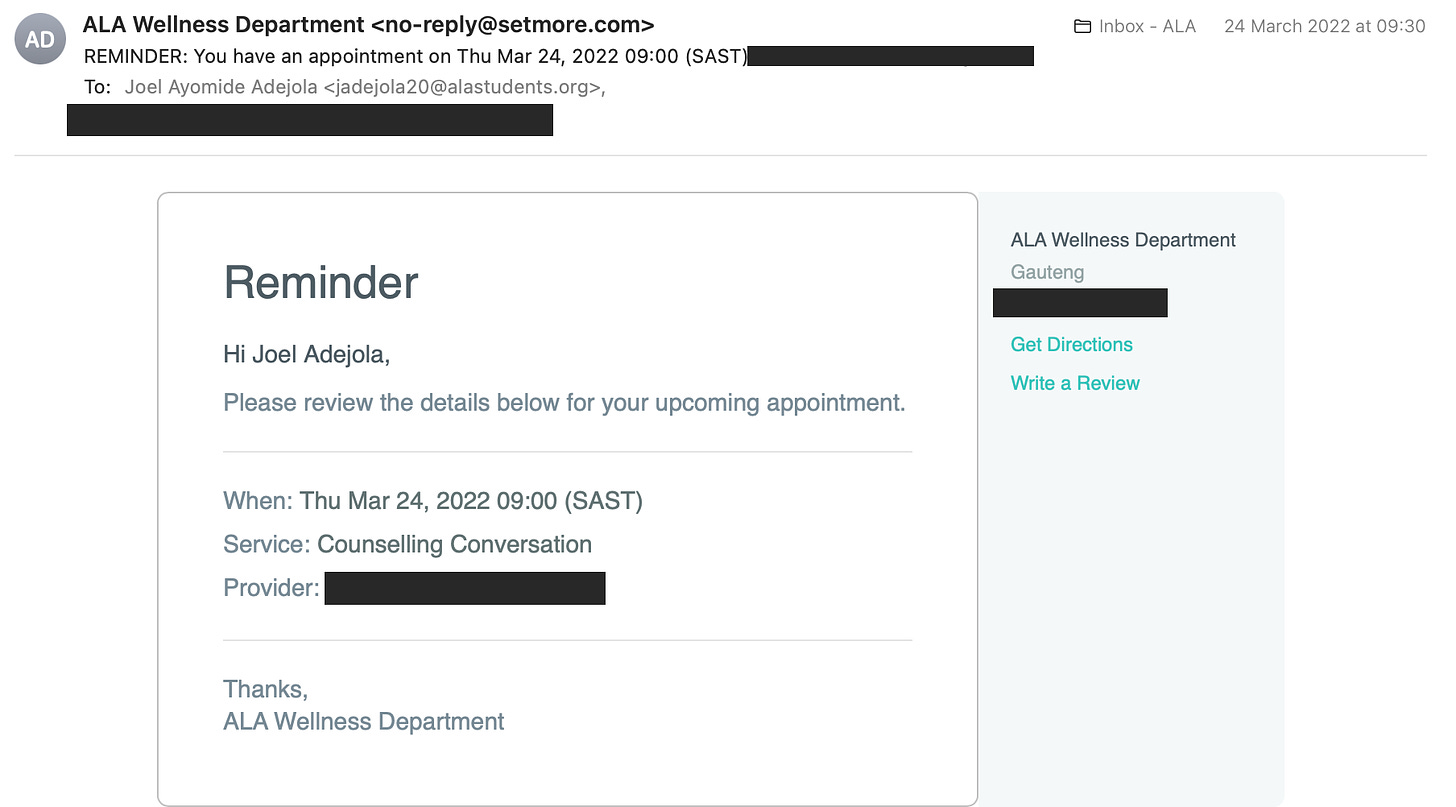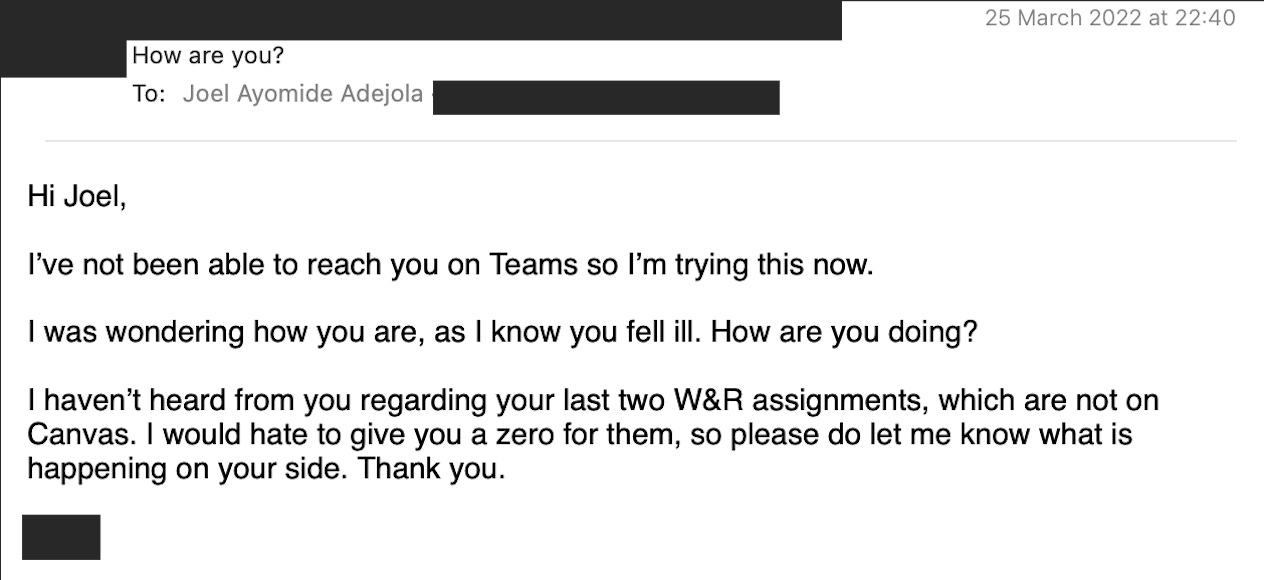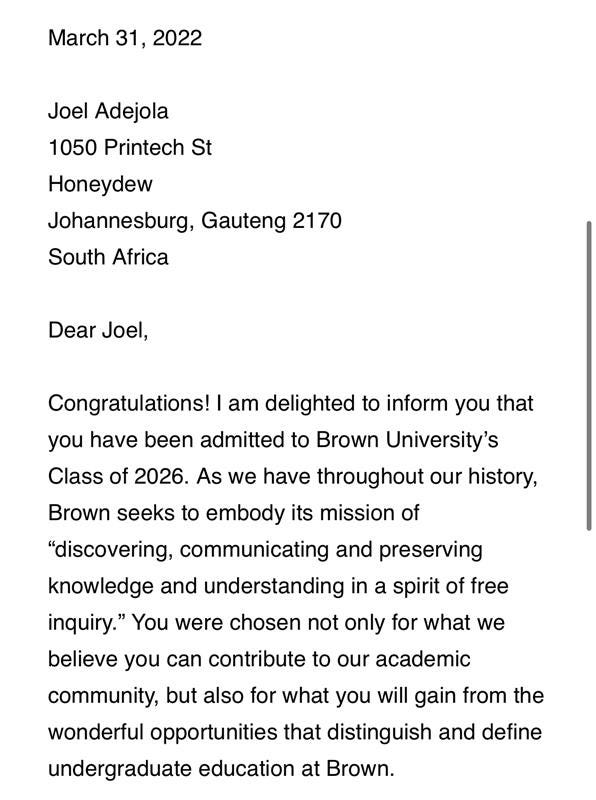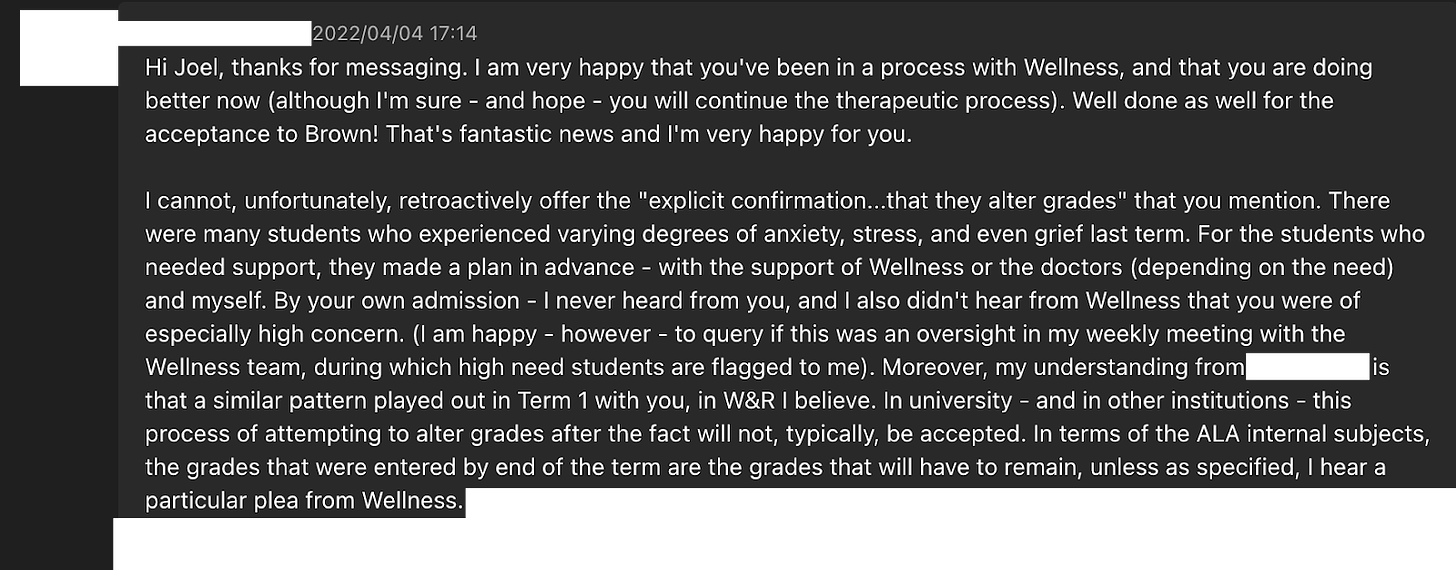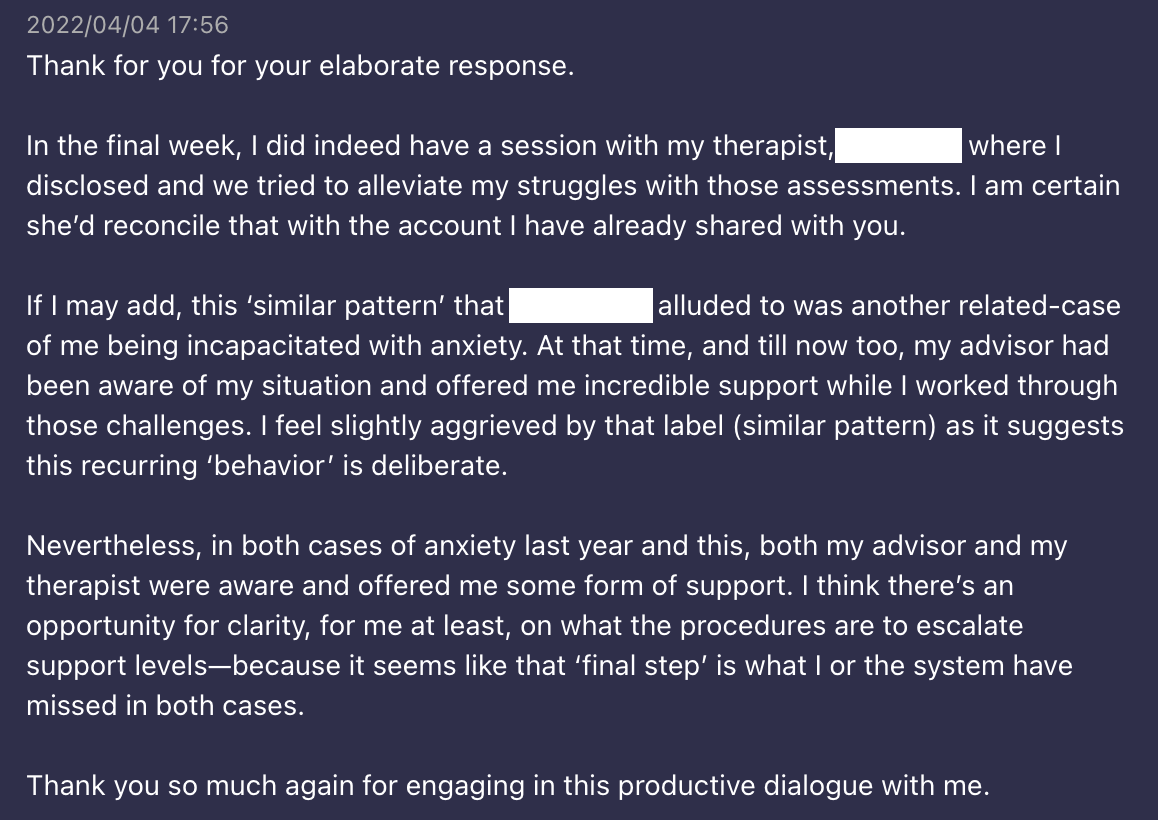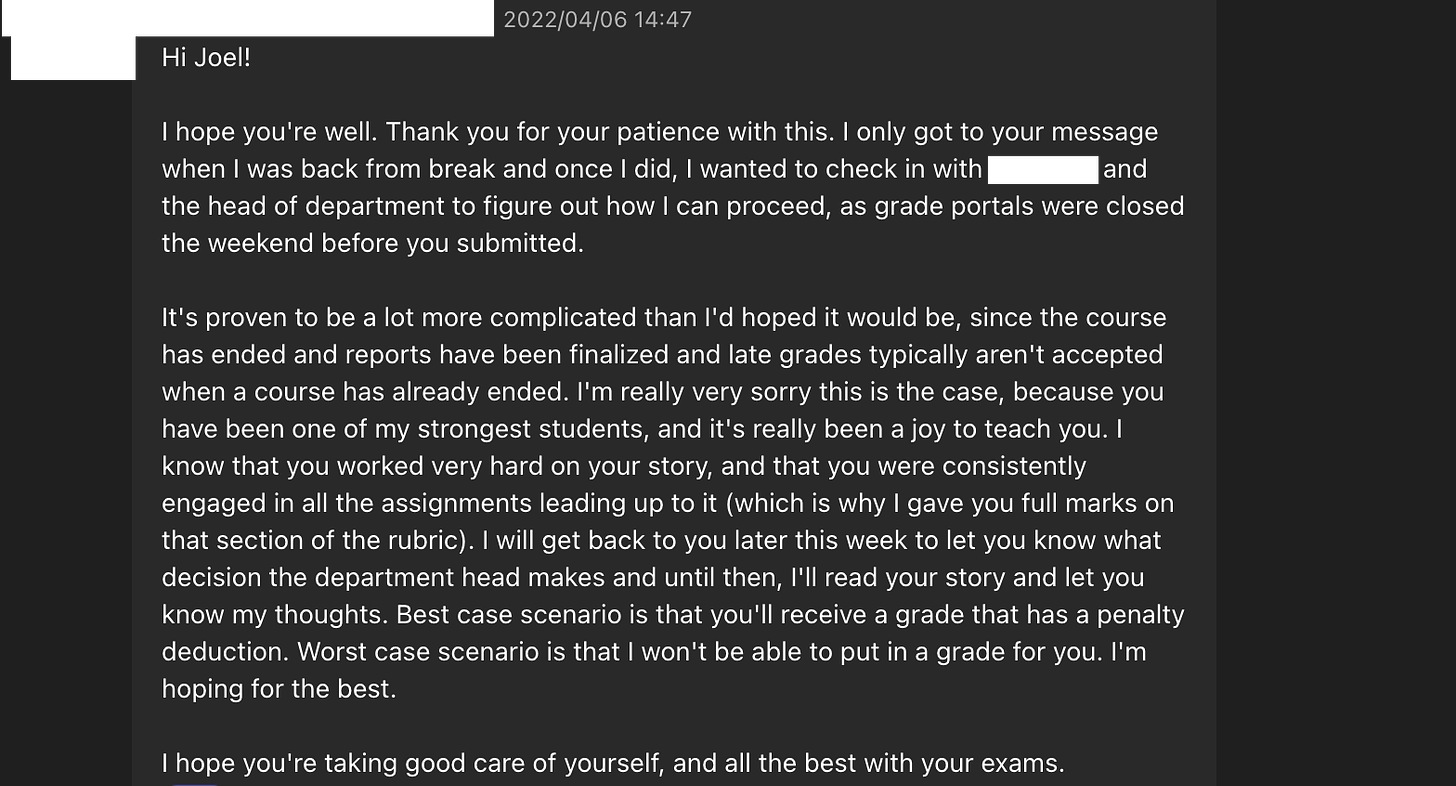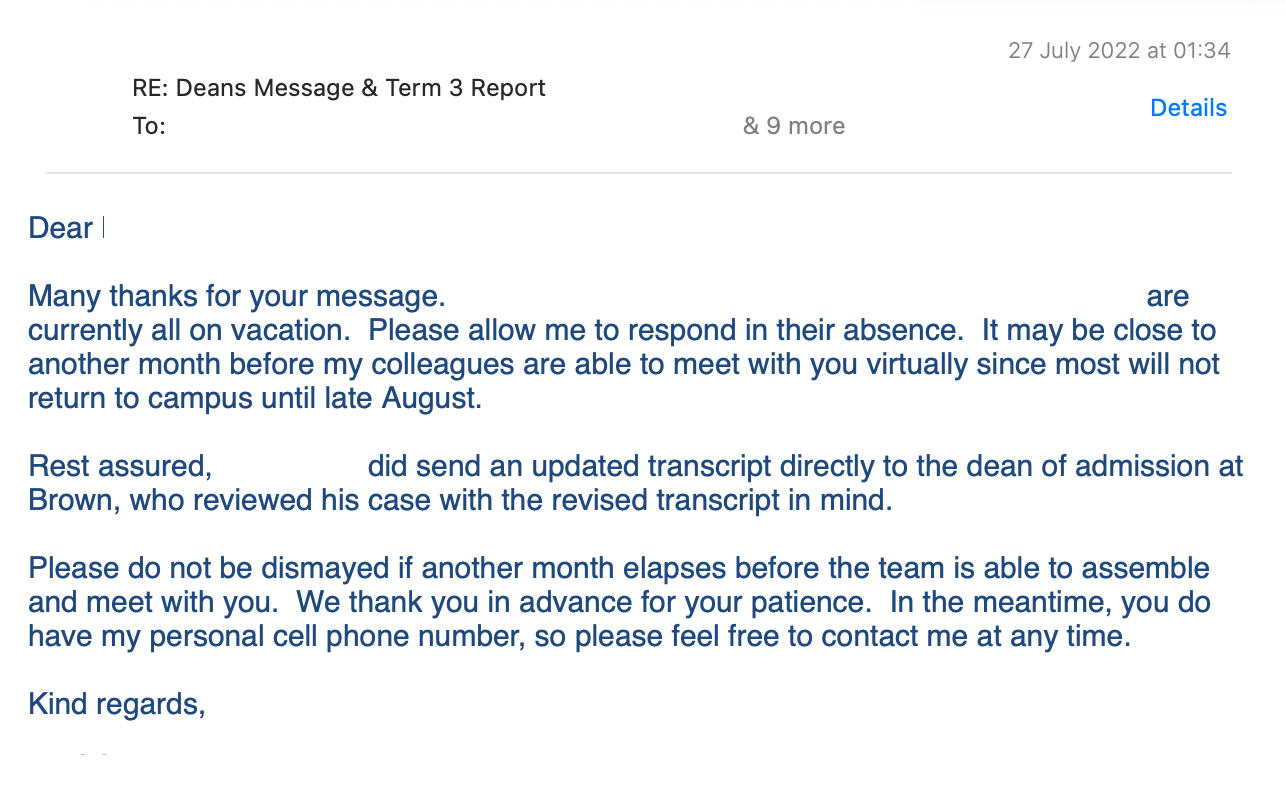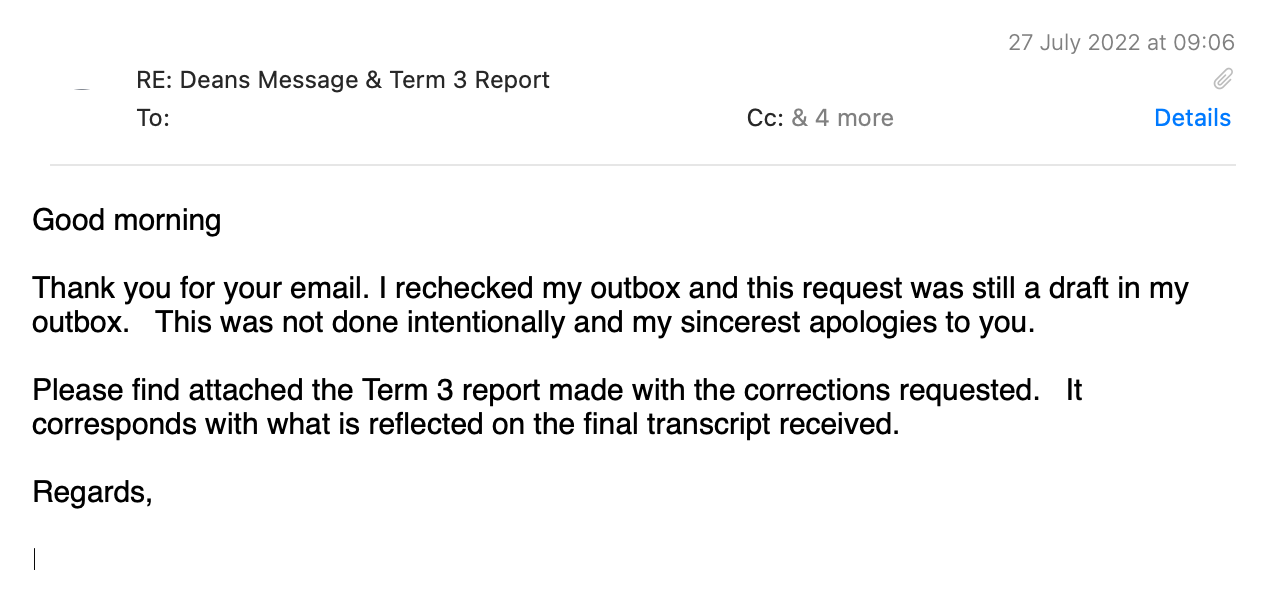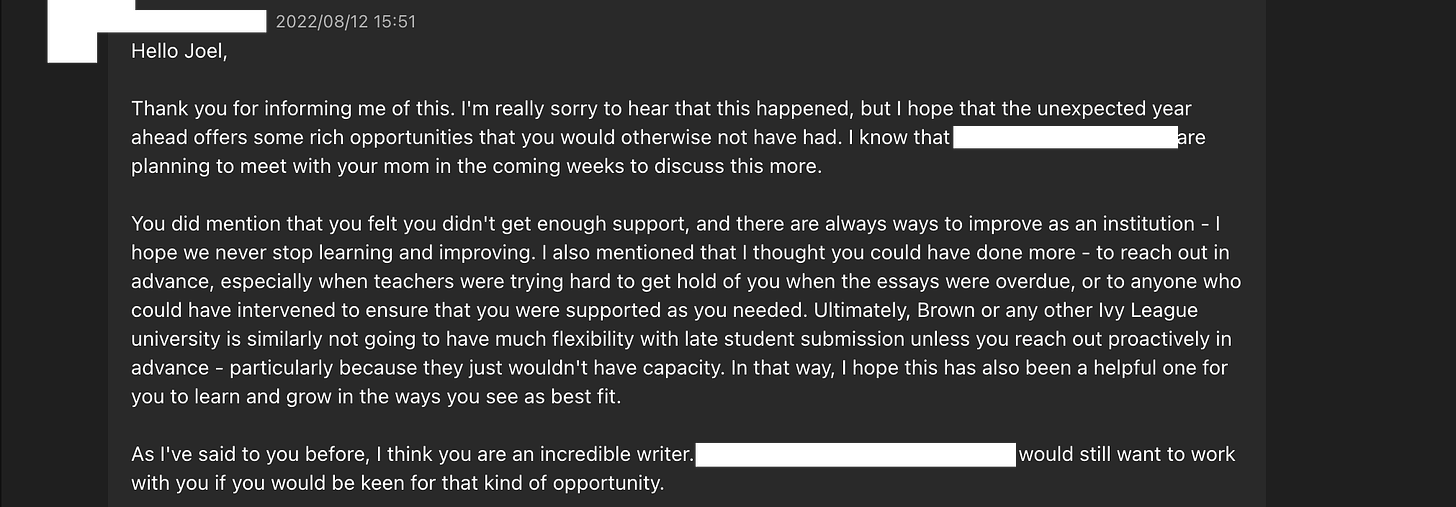A Catharsis: Interrogating the African Leadership Academy Administration’s Apprehensiveness to Accountability.
“It is not power that corrupts but fear. Fear of losing power corrupts those who wield it and fear of the scourge of power corrupts those who are subject to it…” – Aung San Suu Kyi
Pre-read
My fully-funded admission to Brown University (class of '26) was rescinded on the eve of resumption last year. Jarring! To top off what had already been an antagonising few months for me, the African Leadership Academy – my alma mata – delivered an inaccurate copy of my transcript to Brown. Then, when I needed redress the most, the administration – not for the first time – ignored my pleas.
As I now enter a designated reflective period of my thoroughly fulfilling gap year, I've finally garnered the courage to speak up and spotlight the accountability that my predicament deserved.
Read my reflection in the first instalment of Caped Corners.
Introduction
Observing Nigeria's election season this year has been a nightmare. Stories of voter suppression and disenfranchisement have flooded our timelines with little to no accountability against those responsible. This might have always been the case, but this was the first time I had fully invested myself in these 'real' issues.
In 2019, I was sealed up in boarding school and spent the weekend organising a mock election for the students to practise exercising their franchise. In 2015, I was in 7th grade – probably dealing with class squabble and deliberating how to avoid that senior upstairs. This year was different. Besides the inevitable 'adulting', something else spurred me into this irreversible path to journalism, political commentary, and politicking: African Leadership Academy (ALA or the Academy).
After graduating high school in 2020, I decided that I needed more growth before pursuing a college education. I found that and more at the Academy. Besides its grand vision for developing future African leaders, ALA was great because of the community: the committed students, continent-wide diversity, passionate teachers, the unshakable hopefulness of our endeavours, and the conversations that all these fostered.
In one of my African Studies classes, we negotiated the elements of a decolonised African Studies Curriculum after digging into Amina Mama's "Is It Ethical to Study Africa? Preliminary Thoughts on Scholarship and Freedom." How do we ensure our studies for the continent remain relevant – since most educational pathways lead us out of it?
In another, we latched onto either side of Achebe and Thiong'o's deliberation about the 'appropriate' language of African literature. And in my favourite class, we immersed ourselves in the works of prominent African philosophers and weaved arguments on local ethical issues. My final paper discussed the ethics of our institution accepting donations from the Oppenheimer family.
This heightened appreciation for identity, ideologies, and what it meant to be African raised my expectations for my ALA. However, the manner in which classroom conversations were facilitated did not reflect in these important administrative proceedings, which I will explain in the following sections.
Initial Setback: Student Support Loop-Hole
In March 2022, I was completing my final coursework for two core classes: African Studies - Writing the African Experience, and Writing and Rhetoric (W&R). These two classes were a treat for eager writers like myself! In the first, I was curating a short story of a young Nigerian footballer whose pathway to going professional was impeded by a freak accident injury. While in the W&R, the class **navigated** the impending dangers of new technology on our social frameworks; I have since followed up with this interest and spent a significant chunk of my gap year doing research on it!
However, around the crunch week (of the 20th), I encountered some challenges finalising the essay submissions. I reached out to my therapist (from the wellness department) – not for an exemption, as was an option, but to help me work through my anxiety-induced writer's block. We were no strangers, so they had more context beyond just the assigned deliverable.
The relevant teachers also reached out to me to check in on me and asked if they could help in any way; they were aware that I was ill. Kind.
Here is one of such emails.
In a now-deleted Teams message, the other teacher assured me that as long as I had notified either the Wellness Department or my Year Head (one of the staff facilitating student welfare), they'd assess my essay once it was completed. As is seen above, I already met with Wellness for assistance.
It was during this week that I expected and received a pleasant admission response from Brown University!
However, this anticipation was fleeting. I got back to school and followed up with my Year Head about my completed submissions. I reiterated my status to them and asked her to kindly confirm to the relevant teachers that they could indeed assess my essays and grades. This was their response:
NB: Moreover, my understanding from [the Director of Teaching and Learning]...
I was taken aback that they didn't already know about the situation. The teachers knew. My advisor knew. My therapist knew. Due process, which had been echoed across our time at the institution, implied that they should've been aware once I logged in with the wellness department. I came to find out that this monitoring process was only done manually – a once-a-week 'student support recollection'. And since my contact with my therapist that week happened after this prescribed date – the Year Head was oblivious to my situation. There was evidently a huge procedural flaw in the communication pipeline.
I also took exception to the Year Head and Director of Teaching and Learning's suggestion that my situation was patterned. Having someone in my student support ecosystem downplay and deflect my situation in that manner was shocking.
I echoed these thoughts to the Year Head.
This ‘similar pattern’ that [Director of Teaching and Learning]...
In the subsequent days, my therapist obliged and shared a detailed brief affirming the situation and assured me that all would be well. I mean…I wasn't lying about anything. Nevertheless, the rhetoric referenced by the Year Head and the Director of Teaching and Learning made me particularly unsettled.
I disclosed to my therapist that I was not confident of obtaining redress, given that those persons in authority had preemptively drawn conclusions from my situation without any context.
I was right. The concerned teachers who, two weeks prior, had highlighted what needed to be done for my grades to be resolved unsent their message on Teams. Then, in response to my eventual submission, they said this instead:
I wanted to check in with [Year Head] and…
I was essentially hung out to dry because of something that evidently stemmed from a procedural issue in the Academy's support structure.
My Year Head later informed me that they would meet with the Director of Teaching and Learning and the Dean of Student Life to discuss my case. However, none of these persons spoke to me about the situation, nor was I invited to any 'panel'.
So I reached out to my Year Head. During the conversation, my year head asked about my relationship with the Director of Teaching and Learning. There was little to speak of; they had taught me W&R the previous term, and we had minor squabbles over my writing approach. The hitch was basically that the teacher preferred being involved in all aspects of the writing process (brainstorming, outlining, pre-drafting, finishing) – whereas I was much more comfortable and productive working through the first two sections on my own. That class eventually earned my first B (77) at the Academy.
After sharing this with my Year Head, they sharply remarked (rough quote),' of all people to have had issues with, [Director of Teaching and Learning] should have been the last.' I was stunned and sharply interjected, asking the Year Head to repeat the comment, and they refused. At that moment, it was pretty clear what had conspired here. These "issues" with the [Director of Teaching and Learning] must have influenced the decision.
In the following days, I received a meeting notification for a 'credit meeting' – which is typically held for students who were at risk of losing credits for missing classes or students whose grades had not met the minimum threshold. My invitation implied that the decision had been made not to grade my assessment. During the meeting, the Year Head informed me that a committee had sat and concluded the following outcomes:
They would not be grading my assessments,
This decision would mean that I'd lose credit for W&R and thus be ineligible for graduation since it's a core credit requirement,
However, since all my teachers echoed my consistency and strong standing in their respective classes,
They would compromise by using the average of my (incomplete) term 2 grade (38) with my term 1 grade (77) and award me a grade (58) and credit for term 2,
My African studies grade (60) would remain unchanged,
They would not direct me to send any letter to Brown like they had instructed other students with credit issues,
Rather, they were willing to send a 'support letter' to Brown detailing the situation and affirming my 'good standing',
They had asked one of the school's university counsellors about the situation and received a guarantee that the aforementioned outcomes would not affect my admission,
Finally, these decisions were being made to 'teach me a lesson' as I moved onto my next path.
You can take some time to breathe and re-read these outcomes because I, personally, found them rather ridiculous.
It doesn't stop there. I was also informed that the specific composition of the 'committee' that came to this conclusion was not going to be disclosed to me. Why? I never got an answer. But the fact was that a 'committee' of this sort was not constitutionalised in the school's handbook and that their anonymity devolved them of any accountability.
Since neither my advisor nor myself took part in any deliberation with the committee, I asked the year head which person in the committee advocated for me. The Year Head claimed that they did. Ha! According to the ALA's handbook, such student-concerned interrogation should be held with the student, their advisor, and any extra staff requested by the student.
I pinched back:
I asked where the provisions for this' grade manipulation' were enshrined – given the core of the Year Head's argument was that the "process of attempting to alter grades after the fact will not, typically, be accepted."
I also questioned the rationale and sensibility of it if I was truly the defaulter that they had made me out to be.
I asked why my admission to Brown was being considered in an internal process.
I asked why they were willing to send a 'support letter' backing me if I was truly complicit and also questioned the worth of such a letter – given how paradoxical the situation would appear.
I asked whether they had considered the glaring gaps in their communication pipeline that led us here.
To all of these inquiries, I received no response worth reiterating: just that I should move on and try to finish well.
So I ask you, the reader, how different were these processes – the intentional neglect and outcome – from Nigeria's recently concluded election where after thousands of people's mandates were allegedly stolen, the incumbent party called for people to 'heal' and 'embrace the opponents'?
Thugs affiliated with the All Progressive Congress unleashed violence against opposition supporters during the Lagos Gubernatorial elections last weekend. And a few hours after their candidate, Babajide Sanwo-Olu, was announced as the winner, his administration suddenly announced a twenty-per cent salary increment for all the state's civil servants. In essence, 'Shut up and be content'.
Most of the seemingly large and immovable problems facing the continent were birthed on smaller scales, stirred by inadequate moderation, and emboldened by silence. This story so far is but one of such incidents – received the bare minimum consideration and then asked to go in peace.
Perhaps, I might have obliged and wrapped up my business at the institution if the administration did not, once more, throw more dirt in my face.
NB: In May, I eventually requested the support letter that 'the committee' had promised, and here's what my Year Head had to say:
This is the same person who claimed to be my advocate in that ‘panel’.
Post Graduation: Error in Final Transcript
After making it to graduation, I opened my transcript and realised that there was an error. I couldn't catch a break.
Thankfully, though, this alteration would be straightforward. I had a budding intrigue in computer science and opted to take extra credits, which ALA offered via the Global Online Academy. Simply put, one of the grades for this class should have read 97 (A*), but the transcript had a 59 (D).
I scrambled and had the program coordinator write an email to the Dean's Office requesting a rectification. The following day, I checked in at the Dean's office and had an administrative secretary alter and return a digital copy – which I then proactively referenced to my university guidance counsellor. I later found out that this adjustment was only made on that pdf and never reflected on the institution's grade database. The consequence? When it was time (July 1) to share my final year report with Brown, the incorrect transcript was retrieved from the database and sent.
On July 4, I received my official final year report from ALA and immediately spotted the error in my transcript. Within 90 minutes, I sent a reply, showing evidence of the mistake and asking for immediate rectification.
Dear [Admin Secretary]
By July 7, I still had not gotten a reply, so I forwarded the email to the deans and requested that they intervene. I was especially committed to fixing this because I knew that Brown would run routine checks on the final transcript and flag any discrepancies. We were now in a red zone.
Still, no correspondence from anyone at the institution since graduation. Not my counsellor – with whom I had mentioned the transcript update. Not the administrative secretary who was supposed to make the adjustments. Not the Deans whose over-sighting I hoped would immediately rectify the situation.
It turns out that a day earlier, on July 6, Brown's admissions office had actually reached out, directing me to write a letter detailing the situation around my transcript. My counsellor finally reached out after seeing this correspondence and asked me to share the updated transcript with them. We also deliberated through a reply to the board of admissions.
By this point, I was at my breaking point with the institution. So in my first letter to Brown's Admissions office, I curated a condensed copy of all that had happened from March till this point – clearly expressing my dismay with the administration's habitual negligence with my matters. My counsellor, however, suggested that I toned down and gave a more 'reflective' and 'positive' look at the situation to affirm my readiness for college. I took this advice with the assumption that ALA – as an institution – would directly send a letter to Brown detailing the specifics of my situation and acknowledging their errors.
In hindsight, I was rather silly to think any such thing would happen.
My watered-down letter and my counsellor's support letter understandably ended up being insufficient to convince Brown of my readiness 'to engage successfully and with enthusiasm in Brown's rigorous and complex environment'. My admission was 'unanimously' rescinded on July 14, and all my immediate plans were scuppered.
Only on July 27 – 23 days after my initial appeal for intervention, 13 days after my admission was rescinded, after several attempted correspondences – did I finally get a response from an administrator at the Academy. They informed me that the other administrators had been 'on vacation,' and that they would only be able to meet with us virtually in late August.
Many thanks for your message. The [Dean of the Academy], [Year Head], [Director of Teaching and Learning], and [University Guidance Counsellor] are currently all on vacation.
Then, a few hours later, the Admin secretary sent me an email claiming that my correction was a ‘draft in [their] outbox.’ They also conveniently remove five of the other correspondents – all administrative staff – from their cc.
In case it wasn’t already clear to you the proportions of negligence the administration had for (my) student welfare and college transition, there you go.
Furthermore, here is my supportive-and-advocative-Year Head’s response to my rescission from Brown:
“I thought you could have done more” - How was I responsible for the procedural issues in your communication pipeline?
“To reach out in advance” - To who exactly – the teachers, the wellness department and advisor who were already aware of my predicament? Or would I only have gotten re-dress if I sent an email to the entire school about the issue?
NB: Now is a good time to add that, as at the day of writing this article, I have still received no reply, correspondence, followup, or even condolence from any of the current Deans at the African Leadership Academy.
They essentially moved on and made me a blob in their dealings. Not too different from Tinubu’s call for Nigerians to ‘move on and heal’.
What Next?: Gap Year and Reflections
In the midst of this unprecedented and painful experience, I found an incorruptible assurance in myself and my efforts across my two years at the Academy. I remained eerily optimistic and have, so far, curated a thoroughly fulfilling gap-year.
In a recent letter to an acquaintance, I wrote:
“Anyway, after an unfathomable series of institutional mishaps, my admissions were snatched from my girth. I have spent the past year at home, re-navigating the…consuming college admissions process and, more importantly, re-discovering my why. The latter has been fulfilling; I have spent the year advocating for marginalised groups in Nigeria’s volatile socio-political climate, writing about football, and, currently, exploring my intrigue for ML/AI (ethics).”
Furthermore, I remained certain of the potential and importance of the ALA’s vision and saw light beyond the systemic failures and administrative nonchalance that befell me. I have since had extensive conversations with the Academy’s CEOs – two in this timeframe – on my situation and the need to promote policies and checks that put the students first.
In another letter titled ‘Unravelling Systemic Failures at ALA’ – written on July 19, 2022 – I raised some of the aforementioned points and gave a summary to the former CEO. Here’s a snippet:
“As we speak, I have received a decision from the admission office at Brown University, and I am no longer a member of its class of 2026. While there is no official appeal process, my counsellor … suggests we send one. I shall relay more information from him as soon as it is available.
Unfortunately, my options are currently limited to me re-applying against Fall 2023. As I progress and painfully work through this process, the decisions from the ‘academic panel’, which concluded to not make any noteworthy accommodations for my health situation, will continue to haunt me. The numbers printed on that transcript will still be considered unfavourably for me in this new application cycle.
Importantly, [though], I do not feel any self-pity about my situation as I am firmly assured of my academic capability, mental fortitude, and leadership ambitions. I am currently putting together a plan for the gap year to allow me to explore some of my passions and demonstrate an enduring yearning for excellence. I will need some support from the Academy during this process and will let you (or the relevant people) know as soon as possible.
On my earlier point, I think an appeal of Brown’s decision will only be viable if it comes from an independent school authority and addresses the specifics of my situation … A separate petition would only be affirming if it puts the matter-of-fact and, ultimately, my best interest first – two things which I have previously written: “do not historically bode well with some of the Academy’s policies” (we can have a separate conversation about this if needed).”
Unfortunately, this CEO left the institution a few days after our productive correspondence – with the former Dean of the Academy taking their place. As far as I know, no action was ever taken on my request in the final paragraph.
So what did happen?
The major ‘advice’ that I was given this admission cycle was that I take online writing courses to supplement the discrepant writing-related-grades on my transcript. The grades for my other classes were 2A*s 2As 1B (for that year), and 2A*s 3As for my first year at the Academy.
The current CEO informed me that, despite the circumstances around my situation being evidently flawed, there would be no retrospective action taken.
For this admissions cycle, ALA’s University Guidance department passed my file to a consultant counsellor – who was practically unaware of any of the complications that you’ve just read.
They were just going to have us brush everything under the carpet and act like it never happened. How exciting!
So you can understand why I chuckled when, a few days ago, a former ALA parent asked me if the institution had supported me during this enforced gap year.
Furthermore, the current set of Deans – who were directly involved in the mishaps – have still not been so gracious as to spare me a call or message. It seems, though, that they have begun implementing changes to prevent a similar disaster that befell me – specifically, a more elaborate grade verification process where students sign off grade sheets at the end of the term. But one must ask how genuine these improvements are, given that the situation and victims of the preceding failures were never acknowledged.
It is easier for the ALA administration to separate themselves from the huddle, develop policies, and appear as some grandiose thinker than it is for them to acknowledge errs, seek feedback from the community and stir change from within.
This is not true ethical leadership – one which the institution prides itself on instilling. It is a surface-level, symptom-treating, and disingenuous way of leading transformation. These are not my words too; I've pulled them right out of ALA's mission statement:
“Africa’s greatest need is ethical and entrepreneurial leadership. Too often, we only invest in addressing the symptoms of poor leadership in Africa: we give blankets, food, and medicine to those impacted by war, poverty, and famine. But these efforts will never stop unless we develop leaders who prevent wars, entrepreneurs who create jobs, and innovators that develop lasting solutions to the root causes of Africa’s problems.”
It is on this point, specifically, that I write and publish this grilling piece on this fine day in March.
What does accountability look like in our community? What do our institutions owe us? What do we owe our community? Finally, how do we make such accountability equitable; if my family were one of the Academy’s grand donors, is it conceivable that we would have received no audience on my situation till today?
For Thomas Sankara, such revolutions must be preceded by a ‘mad’ moment – a group speaking up against oppression or, in my case, sharing this difficult story with you. In Sankara’s words:
”I would like to leave behind me the conviction that if we maintain a certain amount of caution and organisation we deserve victory. You cannot carry out fundamental change without a certain amount of madness. In this case, it comes from nonconformity, the courage to turn your back on the old formulas, the courage to invent the future. It took the madmen of yesterday for us to be able to act with extreme clarity today. I want to be one of those madmen. We must dare to invent the future.”
Today, I – too – have chosen to be a madman.
Joel A. A.
March 25, 2023
Gratitude
I thank all my instructors and mates at the African Leadership Academy for helping me grow during my time there. I appreciate my colleagues at the International Centre for Investigative Journalism for showing me that my words carried power. I appreciate the folks at Le Wagon Casablanca for allowing me to discover new ways to comprehend the world. I appreciate the admissions team at Pioneer Academics for appreciating my values, potential, and ability beyond the black-and-white ink. I appreciate those who I'm still yet to meet in this momentous year and pray that our interactions are filling. I appreciate my friends, most of whom will be reading this situation for the first time, for unknowingly driving me on during the past eight months – and I pray that they forgive my loud silence.
I appreciate my family, for being family.
Finally, there are more grievances that I've been unable to include in this 4000-word brief. If you'd like to share a thought or have a chat, feel free to leave me a message at joeladejola@substack.com. You can also find additional information in my recent LinkedIn Posts.




